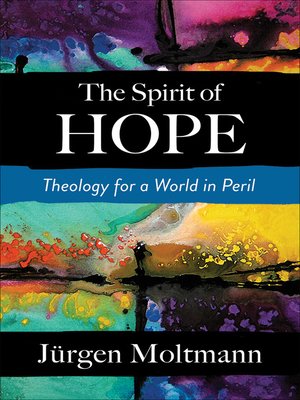
Sign up to save your library
With an OverDrive account, you can save your favorite libraries for at-a-glance information about availability. Find out more about OverDrive accounts.
Find this title in Libby, the library reading app by OverDrive.



Search for a digital library with this title
Title found at these libraries:
| Library Name | Distance |
|---|---|
| Loading... |
Famous theologian Jrgen Moltmann returns here to the theme that he so powerfully addressed in his groundbreaking work, Theology of Hope. In the twenty-first century, he tells us, hope is challenged by ideologies and global trends that would deny hope and even life itself. Terrorist violence, social and economic inequality, and most especially the looming crisis of climate change all contribute to a cultural moment of profound despair. Moltmann reminds us that Christian faith has much to say in response to a despairing world. In the eternal yes of the living God, we affirm the goodness and ongoing purpose of our fragile humanity. Likewise, Gods love empowers us to love life and resist a culture of death.
The books two sections equally promote these affirmations, yet in different ways. The first section looks at the challenges to hope in our current world, most especially the environmental crisis. It argues that Christian faithand indeed all the worlds religionsmust orient themselves toward the wholeness of the human family and the physical environment necessary to that wholeness. The second section draws on resources from the early church, the Reformation, and the contemporary theological conversation to undergird efforts to address the deficit of hope he describes in the first section.
|Famous theologian Jrgen Moltmann returns here to the theme that he so powerfully addressed in his groundbreaking work, Theology of Hope. In the twenty-first century, he tells us, hope is challenged by ideologies and global trends that would deny hope and even life itself. Terrorist violence, social and economic inequality, and most especially the looming crisis of climate change all contribute to a cultural moment of profound despair. Moltmann reminds us that Christian faith has much to say in response to a despairing world. In the eternal yes of the living God, we affirm the goodness and ongoing purpose of our fragile humanity. Likewise, Gods love empowers us to love life and resist a culture of death.
The books two sections equally promote these affirmations, yet in different ways. The first section looks at the challenges to hope in our current world, most especially the environmental crisis. It argues that Christian faithand indeed all the worlds religionsmust orient themselves toward the wholeness of the human family and the physical environment necessary to that wholeness. The second section draws on resources from the early church, the Reformation, and the contemporary theological conversation to undergird efforts to address the deficit of hope he describes in the first section.







